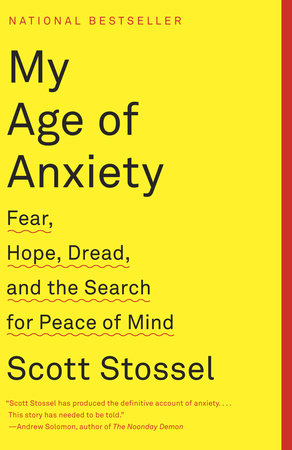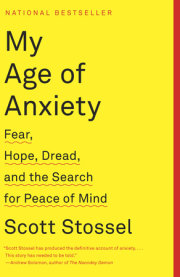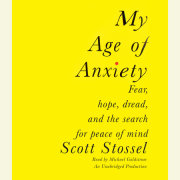Some eighty years ago, Freud proposed that anxiety was "a riddle whose solution would be bound to throw a flood of light on our whole mental existence." Unlocking the mysteries of anxiety, he believed, would go far in helping us to unravel the mysteries of the mind: consciousness, the self, identity, intellect, imagination, creativity — not to mention pain, suffering, hope, and regret. To grapple with and understand anxiety is, in some sense, to grapple with and understand the human condition.
The differences in how various cultures and eras have perceived and understood anxiety can tell us a lot about those cultures and eras. Why did the ancient Greeks of the Hippocratic school see anxiety mainly as a medical condition, while Enlightenment philosophers saw it as an intellectual problem? Why did the early existentialists see anxiety as a spiritual condition, while Gilded Age doctors saw it as a specifically Anglo-Saxon stress response — a response that they believed spared Catholic societies — to the Industrial Revolution? Why did the early Freudians see anxiety as a psychological condition emanating from sexual inhibition, whereas our own age tends to see it, once again, as a medical and neurochemical condition, a problem of malfunctioning biomechanics?
Do these shifting interpretations represent the forward march of progress and science? Or simply the changing, and often cyclical, ways in which cultures work? What does it say about the societies in question that Americans showing up in emergency rooms with panic attacks tend to believe they're having heart attacks, whereas Japanese tend to be afraid they're going to faint? Are the Iranians who complain of what they call "heart distress" suffering what Western psychiatrists would call panic attacks? Are the
ataques de nervios experienced by South Americans simply panic attacks with a Latino inflection — or are they, as modern researchers now believe, a distinct cultural and medical syndrome? Why do drug treatments for anxiety that work so well on Americans and the French seem not to work effectively on the Chinese?
As fascinating and multifarious as these cultural idiosyncrasies are, the underlying consistency of experience across time and cultures speaks to the universality of anxiety as a human trait. Even filtered through the distinctive cultural practices and beliefs of the Greenland Inuit a hundred years ago, the syndrome the Inuit called "kayak angst" (those afflicted by it were afraid to go out seal hunting alone) appears to be little different from what we today call agoraphobia. In Hippocrates's ancient writings can be found clinical descriptions of pathological anxiety that sound quite modern. One of his patients was terrified of cats (simple phobia, which today would be coded 300.29 for insurance purposes, according to the classifications of the fifth edition of the
Diagnostic and Statistical Manual, the
DSM-V) and another of nightfall; a third, Hippocrates reported, was "beset by terror" whenever he heard a flute; a fourth could not walk alongside "even the shallowest ditch," though he had no problem walking
inside the ditch — evidence of what we would today call acrophobia, the fear of heights. Hippocrates also describes a patient suffering what would likely be called, in modern diagnostic terminology, panic disorder with agoraphobia (
DSM-V code 300.22): the condition, as Hippocrates described it, "usually attacks abroad, if a person is travelling a lonely road somewhere, and fear seizes him." The syndromes described by Hippocrates are recognizably the same clinical phenomena described in the latest issues of the
Archives of General Psychiatry and
Bulletin of the Menninger Clinic.
Their similarities bridge the yawning gap of millennia and circumstances that separate them, providing a sense of how, for all the differences in culture and setting, the physiologically anxious aspects of human experience may be universal.
In this book, I have set out to explore the "riddle" of anxiety. I am not a doctor, a psychologist, a sociologist, or a historian of science — any one of whom would bring more scholarly authority to a treatise on anxiety than I do. This is a work of synthesis and reportage, yoking together explorations of the idea of anxiety from history, literature, philosophy, religion, popular culture, and the latest scientific research — all of that woven through something about which I can, alas, claim extensive expertise: my own experience with anxiety. Examining the depths of my own neuroses may seem the height of narcissism (and studies do show that self-preoccupation tends to be tied to anxiety), but it's an exercise with worthy antecedents. In 1621, the Oxford scholar Robert Burton published his canonical
The Anatomy of Melancholy, a staggering thirteen-hundred-page work of synthesis, whose torrents of scholarly exegesis only partially obscure what it really is: a massive litany of anxious, depressive complaint. In 1733, George Cheyne, a prominent London physician and one of the most influential psychological thinkers of the eighteenth century, published
The English Malady, which includes the forty-page chapter "The Case of the Author" (dedicated to "my fellow sufferers"), in which he reports in minute detail on his neuroses (including "Fright, Anxiety, Dread, and Terror" and "a melancholy Fright and Panick, where my Reason was of no Use to me") and physical symptoms (including "a sudden violent Head-ach," "extream Sickness in my Stomach," and "a constant Colick, and an ill Taste and Savour in my Mouth") over the years. More recently, the intellectual odysseys of Charles Darwin, Sigmund Freud, and William James were powerfully driven by their curiosity about, and the desire to find relief from, their own anxious suffering. Freud used his acute train phobia and his hypochondria, among other things, to construct his theory of psychoanalysis; Darwin was effectively housebound by stress-related illnesses after the voyage of the
Beagle — he spent years in pursuit of relief from his anxiety, visiting spas and, on the advice of one doctor, encasing himself in ice. James tried to keep his phobias hidden from the public but was often quietly terrified. "I awoke morning after morning with a horrible dread in the pit of my stomach and with a sense of insecurity of life that I never knew before," he wrote in 1902 of the onset of his anxiety. "For months, I was unable to go out in the dark alone."
Unlike Darwin, Freud, and James, I'm not out to adumbrate a whole new theory of mind or of human nature. Rather, this book is motivated by a quest to understand, and to find relief from or redemption in, anxious suffering. This quest has taken me both backward, into history, and forward, to the frontiers of modern scientific research. I have spent much of the past eight years reading through hundreds of thousands of the pages that have been written about anxiety over the last three thousand years.
My life has, thankfully, lacked great tragedy or melodrama. I haven't served any jail time. I haven't been to rehab. I haven't assaulted anyone or carried out a suicide attempt. I haven't woken up naked in the middle of a field, sojourned in a crack house, or been fired from a job for erratic behavior. As psychopathologies go, mine has been — so far, most of the time, to outward appearances — quiet. Robert Downey Jr. will not be starring in the movie of my life. I am, as they say in the clinical literature, "high functioning" for someone with an anxiety disorder or a mental illness; I'm usually quite good at hiding it. More than a few people, some of whom think they know me quite well, have remarked that they are struck that I, who can seem so even-keeled and imperturbable, would choose to write a book about anxiety. I smile gently while churning inside and thinking about what I've learned is a signature characteristic of the phobic personality: "the need and ability" — as described in the self-help book
Your Phobia — "to present a relatively placid, untroubled appearance to others, while suffering extreme distress on the inside." *
To some people, I may seem calm. But if you could peer beneath the surface, you would see that I'm like a duck — paddling, paddling, paddling.
*
"For many, many people who have anxiety disorders — particularly agoraphobia and panic disorder — people would be surprised to find out that they have problems with anxiety because they seem so'together' and in control," says Paul Foxman, a psychologist who heads the Center for Anxiety Disorders in Burlington, Vermont. "They seem to be comfortable, but there's a disconnection between the public self and the private self."
Copyright © 2013 by Scott Stossel. All rights reserved. No part of this excerpt may be reproduced or reprinted without permission in writing from the publisher.










